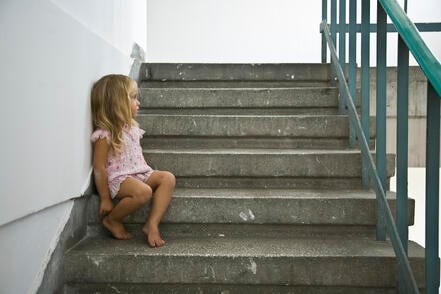If you've followed the news at all the last couple of weeks, it's been hard to miss the media coverage of the 50-year anniversary of the War on Poverty launched during the Johnson Administration.

[image: iStockPhoto]
Pundits of all persuasions have taken stock of the nation's progress, or lack thereof, in addressing poverty and the impact of the federal government's arsenal, such as Head Start, Medicare, and Medicaid.
Depending on where you consume news, you might have a favorable or unfavorable impression of whether we're winning or losing this war. What's undeniable is that poverty is still a major problem. What's been missing from the coverage I've seen (and I try my best to consume my news from a range of sources--conservative to progressive) is the lack of discussion about the role of family structure. Although to be fair, this discussion has had more legs among journalists and academics who lean conservative.
As I pointed out in a recent blog post titled "Poverty Sucks," children who grow up in father-absent homes are much more likely to live in poverty than are children who grow up with their dads. I also pointed out that the effects of poverty on the brain and parenting are striking.
A recent study by Child Trends sheds further light on just how devastating poverty is, especially for our nation's children. Today's generation of infants and toddlers--some 12 million of them--face the following economic hardships:
- Nearly half (48 percent) of America’s infants and toddlers live in low-income families (incomes less than twice the poverty line); one-quarter (25 percent) live in families below the official poverty line.
- One in eight (13 percent) is in deep poverty (that is, their family’s income is half or less than the poverty level).
- Economic disadvantage is concentrated in the families of black and Latino infants and toddlers; fully two-thirds (66 percent) of these young children are in low-income families.
- Nearly one in four (24 percent) black and Latino infants and toddlers live in households that are “food-insecure” (a measure of inability to obtain sufficient healthy food).
As striking and depressing as these facts are, I am also struck and saddened by the lack of attention paid to father absence by the federal government. It was nearly 30 years into the War on Poverty before for an administration (Clinton-Gore) started a significant discussion on the contribution of father absence to poverty and even longer for an administration (Bush-Cheney) to put some money toward addressing this root cause of poverty. Unfortunately, those funds--approximately 500 million in the last 8 fiscal years--have paled in comparison to the billions in funding in the five decades of the War on Poverty for programs that address the outcomes of poverty rather than its root causes.
Should the federal government do more to address father absence? What do you think?